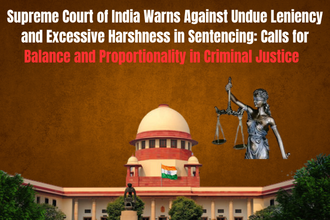The Supreme Court of India has affirmed that once a State Government prescribes a higher ceiling for gratuity, all employees governed under that regulatory framework are entitled to the revised benefits without discrimination. The Court upheld the Gauhati High Court’s decision granting higher gratuity to retired employees of the Assam Financial Corporation (AFC), holding that the corporation cannot deny the enhanced limit merely because it did not formally notify or adopt the revised amount in time.
The judgment came in the case titled:
The Assam Financial Corporation Limited & Ors. v. Bhabendra Nath Sarma & Ors.
A Division Bench of the Supreme Court comprising Justice J.K. Maheshwari and Justice Vijay Bishnoi dismissed AFC’s appeal and held that employees who retired after the State Government increased the gratuity limit were entitled to the updated amount, even if AFC implemented the change at a later date.
Background of the Case
A group of employees retired from the Assam Financial Corporation between 2018 and 2019. Upon retirement, they received gratuity with a ceiling of ₹7,00,000, which was the limit fixed under the AFC Staff Regulations, 2007.
However, the Government of Assam, following the amendments in the Payment of Gratuity Act, 1972, had already revised the gratuity ceiling to ₹15,00,000 for its employees. The retired AFC employees argued that since Regulation 107 linked their gratuity to the limit notified by the State Government, they should also receive the enhanced amount.
They approached the Gauhati High Court, where both the Single Judge and Division Bench agreed that:
- The gratuity limit applicable to AFC employees must follow the State Government’s limit.
- The employees were entitled to ₹15 lakhs, not ₹7 lakhs.
AFC challenged this before the Supreme Court, arguing that the enhancement could not apply until its Board approved the change.
AFC’s Stand Before the Supreme Court
The Corporation argued:
- Autonomy of AFC: As a statutory body, AFC claimed it could decide independently on employee benefits and implementations.
- Board Approval Requirement: AFC contended that unless its Board formally adopted the revised ceiling, the old ₹7 lakh limit remained in force.
- No Automatic Application: The Corporation argued that the State’s notification could not automatically extend to AFC employees without internal action.
Respondents’ Argument
The retired employees maintained that:
- Regulation 107 of the AFC Staff Regulations clearly linked gratuity to the limit fixed by the State Government.
- The delay in AFC’s internal approval was administrative and cannot reduce employees’ legal entitlement.
- The higher limit was already in force at the time of their superannuation, and therefore must apply to them.
Supreme Court’s Reasoning
The Court carefully interpreted Regulation 107 and observed that the gratuity limit for AFC employees was directly tied to the limit applicable to Government of Assam employees.
“Once the State Government has fixed a higher gratuity limit, there can be no discrimination based on delay in implementation by the Corporation.”
The Court rejected AFC’s argument that internal approval was necessary, clarifying that such a requirement would:
- Defeat the purpose of linking AFC benefits to State policy.
- Allow bureaucratic delays to unfairly deny rightful benefits.
- Result in inequitable treatment of employees who retired before formal adoption.
The Court noted that an employer’s administrative lethargy cannot reduce the retirement benefits of employees.
Key Passage from the Judgment
“It would be absolutely inequitable treatment for the Respondents to suffer at the behest of the AFC’s lethargy. Employees who retired in the interregnum cannot be deprived of the benefit due to delayed compliance.”
Thus, the Supreme Court held that gratuity ceiling of ₹15 lakhs must apply to the retired AFC employees.
Why This Judgment Is Significant
1. Reinforces Principle of Equality
Once a policy applies to a class of employees, uniform application becomes mandatory. No employee can be arbitrarily disadvantaged.
2. Protects Employees From Administrative Delays
Government and public institutions often delay implementation processes. This ruling confirms that retiring employees cannot be penalized for such delays.
3. Ensures Gratuity is Treated as a Social Security Right
Gratuity is a statutory social welfare benefit, not a discretionary payment. The Court’s view strengthens employee rights.
4. Clarifies Interpretation of Linked Pay Structures
Whenever a statutory rule or regulation links benefits to another standard, that standard applies automatically—no separate adoption is needed.
Related Legal Context
- Payment of Gratuity Act, 1972 ensures gratuity to employees on retirement, superannuation, resignation, or death.
- In 2018, the Central Government raised the ceiling from ₹10 lakhs to ₹20 lakhs.
- Many states revised limits accordingly—including Assam increasing its limit to ₹15 lakhs during the relevant period.
This judgment confirms that such State-level enhancements extend to institutions governed by State-linked regulations.
Final Outcome
- AFC’s appeal was dismissed.
- The Court upheld the Gauhati High Court’s findings.
- The retired employees are entitled to ₹15 lakh gratuity ceiling along with any differential amount due.
Conclusion
This ruling marks an important affirmation of employee rights and principles of equality in public employment. The Supreme Court has clarified that once the State revises gratuity limits, all employees governed by corresponding regulations are automatically entitled to such benefits. The Court refused to allow administrative delay to deny benefits, ensuring fairness to retirees who had already completed their service.
This decision prevents discriminatory practices and strengthens the understanding that gratuity is a right, not a concession.


